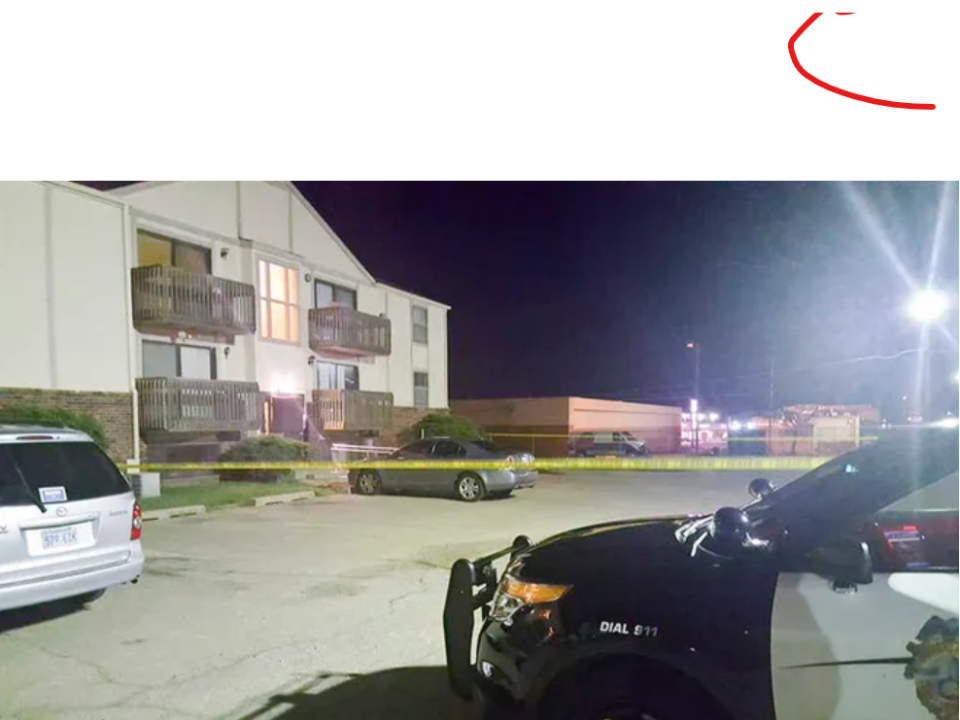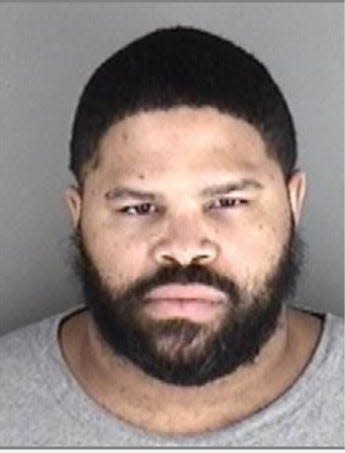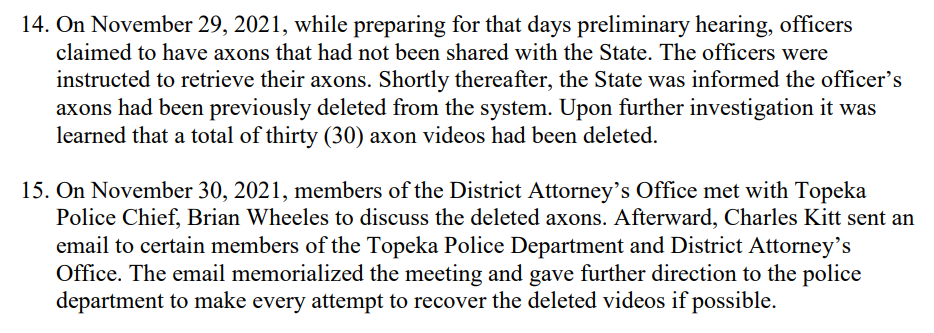Topeka triple murder defendant seeks case's dismissal after body camera videos destroyed
Topeka triple homicide defendant Yanez Sanford is seeking to have the case against him be dropped after 30 police body camera videos taken as part of the investigation involved were destroyed.
Sanford was charged with crimes that included capital murder in 2020 after new evidence emerged about the killings, committed in 2016 at a southwest Topeka apartment complex, court records say. Sanford is accused of shooting Dominique Ray, 23; Camrah Trotter, 20, who was pregnant in her third trimester; and Trotter’s unborn daughter.
The 30 videos, taken in 2016, were among evidence a judge ordered preserved in early 2021 in the case against Sanford, said a "motion to dismiss based on the state's failure to preserve evidence" filed Dec. 13 by Emily Barclay, senior assistant capital defender with the state's Death Penalty Defense Unit.
When Topeka police asked for the videos in late 2021 from their body camera provider — Scottsdale, Arizona-based Axon Enterprise, LLC — they learned the videos had been destroyed at the end of their "five-year retention period," court records say.
"There is no pathway for Mr. Sanford to receive fair trial with the deletion of nearly all of the body camera footage in this capital murder case," Barclay's motion said. "The deletion of this invaluable video footage violates his due process rights."
Barclay asked that the case against Sanford be dismissed "with prejudice," in which case it couldn't be refiled. Motion hearings in the case are scheduled to take place beginning Jan. 30.

What happened to the videos?
As part of the discovery process in which the two sides in a court case share information, the state has provided 1,500 pages of reports as well as jail phone calls, dispatch recordings, YouTube videos, phone downloads, surveillance tapes and interviews recorded at Topeka police headquarters, Barclay's motion said.
"There is an abundance of discovery in light of this being a capitally-charged triple homicide," it said. "Notably missing are the Axon police body camera videos that would ordinarily accompany every single Shawnee County felony case, especially one of this magnitude."
After the videos and other evidence were ordered preserved in February 2021, Shawnee County District Attorney Mike Kagay notified then-Interim Topeka Police Chief Bryan Wheeles of that order, according to Barclay's motion. Wheeles became permanent police chief later in 2021.
Topeka police apparently didn’t ask Axon not to delete the videos and didn’t realize the company intention to do so until after it had happened, court records said. Police learned in November 2021 that 30 Axon body camera videos taken as part of the investigation had been "deleted" and couldn't be recovered.
The videos were destroyed before they could be shared with the district attorney's office, Barclay's motion said.
"The Topeka Police Department provided an explanation that these videos were marked as 'evidence' which had a retention period of 5 years, ending in August 2021," it said.
When the crimes involved were committed and the videos were shot in 2016, "There was not a standardized way of labeling videos," Barclay's motion said.
Axon subsequently put in place the standardized labeling system it now uses, but that system was not made retroactive, said an email accompanying Barclay's motion that was dated Nov. 30, 2021, and written by Charles Kitt, now Shawnee County's chief deputy district attorney.
"Furthermore, the videos in this case were on a 5-year retention schedule, so they were automatically purged from TPD's account a month or two ago," Kitt's email said.
He asked that Topeka police complete a full audit of the "Axon issues" in the case. The Capital-Journal submitted a Kansas Open Records Act request Friday to Topeka's city government seeking copies of documents related to any such audit.
Kitt's email said if the videos couldn't be recovered, he expected Sanford's attorneys would seek to have the charges against him dismissed.
Kitt's email suggested similar circumstances were involved in a 2019 Douglas County case in which a defendant was charged with aggravated battery and driving under the influence.
"In that case, the court dismissed the prosecution (with prejudice) for late discovery of evidence that was 'potentially exculpatory" or even 'explanatory,'" Kitt wrote. "I expect we will have to fight that fight if videos are lost here."
"Exculpatory" means "to clear from guilt."

Who is Yanez Sanford accused of killing?
Sanford, 41, faces charges that include capital murder linked to the 2016 killing of a man, a woman and an unborn child at Fairlawn Greens Apartments, immediately south of Topeka West High School at 5235 S.W. 20th Terrace.
Shawnee County District Attorney Mike Kagay said Sanford fatally shot Dominique Ray, 23; Camrah Trotter, 20; and Trotter’s unborn daughter, who was to have been named Ariyah Trotter. Evidence showed Camrah Trotter had also been raped, Kagay said.
Sanford was charged with crimes that included capital murder linked to the killings in September 2020, after new evidence emerged, court records say.
Capital cases require prosecutors to file a notice of intent if they plan to seek the death penalty, which court records show hasn't been done in the case against Sanford.

Why do prosecutors say the case shouldn't be dismissed?
Dan Dunbar — a retired Shawnee County chief deputy district attorney working as a special counsel on the case — filed a response Jan. 12 to Barclay's motion seeking to dismiss it.
Dunbar wrote that for the case to be dismissed, Sanford's attorneys must satisfy the standards set out by a past U.S. Supreme Court ruling requiring them to " prove the missing axons have potential exculpatory value; and the absence of any comparable evidence; and the destruction was done in bad faith, i.e., the destruction was done knowing the potential exculpatory value of the recordings."
While Barclay's motion contended there is no comparable evidence to what was present on the body camera videos, "comparable" does not mean "identical," Dunbar wrote.
"The State anticipates presenting evidence regarding the axons that were deleted," Dunbar wrote. "Most of the officers either have prepared a report of their participation and/or have a recollection of what transpired while wearing their body camera."
Dunbar said, "The State anticipates the Court will hear testimony explaining the innocent nature of the destruction of those videos and the process that was in place when the destruction occurred and how it has been remedied."

Barclay then filed a response Tuesday to the prosecutor's response, arguing that:
• Video evidence, especially when it contains footage of the eyewitnesses in the immediateaftermath of a homicide, is potentially exculpatory or explanatory.
• The state cannot produce comparable evidence to live, simultaneous videos taken of theevents close in time to the triple homicide.
• Courts have found "bad faith" to exist in past situations that involved failure to preserve evidence.
• "The government had knowledge of exculpatory value before the deletion of the videos."
She concluded: "Mr. Sanford submits that the destroyed video in question contained exculpatory value, that no comparable evidence exists, that it was destroyed in bad faith after being provided notice to preserve such videos, and that it was done with knowledge of the exculpatory value."
Contact Tim Hrenchir at threnchir@gannett.com or 785-213-5934.
This article originally appeared on Topeka Capital-Journal: How 30 body camera videos in Topeka triple homicide case were destroyed

